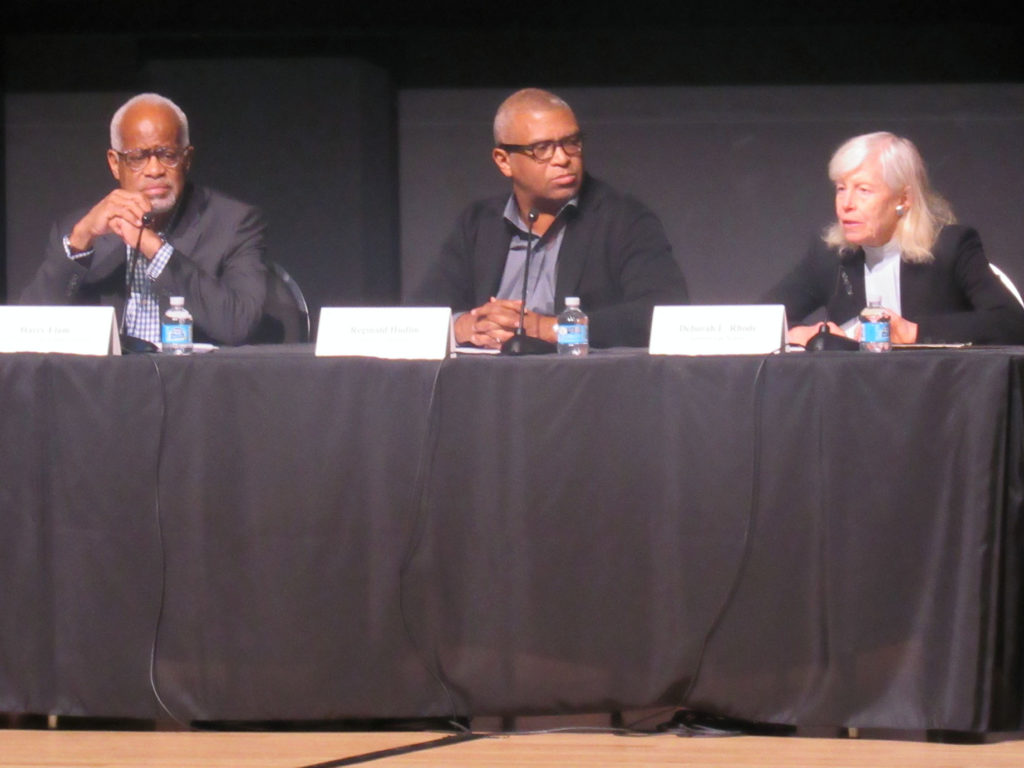Panel Discusses Thurgood Marshall’s Legacy at Pre-Release Screening of New Film

The Stanford Center on the Legal Profession sponsored a special pre-release screening of the film Marshall at Cubberley Auditorium on the Stanford campus Tuesday evening. The film, based on the early career of Supreme Court Justice Thurgood Marshall, premiered on September 20 at Howard University in Washington, DC–Marshall’s law school alma mater. It is set for public release on October 13.
Marshall follows the Supreme Court justice as a young lawyer (Chadwick Boseman) when he was working for the NAACP in a rape case that was highly publicized at the time, but not well known to contemporary audiences. The screenplay is based on a real case involving a black chauffeur (Sterling K. Brown) who was accused of sexual assault by the socialite wife of his wealthy Greenwich Connecticut employer. When a racist judge declines to let Marshall argue the case because he is not a member of the local bar, he is partnered with a courageous local Jewish lawyer Samuel Friedman (Josh Gad), who had no prior criminal trial experience. The two lawyers struggle against fear, violence, and prejudice in order assist the NAACP in a national campaign that laid the groundwork for the Civil Rights Movement. The film also stars Dan Stevens and James Cromwell.
The screening was preceded by a panel discussion featuring the film’s director, Reginald Hudlin, and Stanford Law Professor and Director of the Center on the Legal Profession Deborah Rhode. Stanford Vice Provost for Undergraduate Education Harry J. Elam, Jr. moderated the discussion, which focused on the making of the movie and on why Thurgood Marshall is such an important historical figure.
“This is a moment when we need heroes and Thurgood Marshall was a hero,” said Rhode, a sentiment she shared in an op-ed she penned earlier this month on Marshall’s legacy. “He sacrificed so much of his life to really making the country’s rhetorical promises about equal justice under law something closer to a reality.”
When asked why the film focuses on a lesser-known legal case of Marshall’s as opposed to the landmark case Brown v. Board of Education, Hudlin said “I loved [this case] because it was set in the north. Most films about struggles in civil rights are set in the south and we’ve all seen enough tobacco-chewing sheriffs in our lives that we don’t need to do that again. Northern racism has that veneer of civility about it that makes it much more relatable…and I thought it would be more resonant with contemporary audiences.”
About the Stanford Center on the Legal Profession
The Stanford Center on the Legal Profession, founded in 2008, supports research, teaching, programs and public policy initiatives on crucial issues facing the bar. Central concerns of the center include how to enhance access to justice, sustain ethical values, improve bar regulatory structures, and effectively respond to the changing dynamics of legal workplaces.
About Stanford Law School
Stanford Law School is one of the nation’s leading institutions for legal scholarship and education. Its alumni are among the most influential decision-makers in law, politics, business and high technology. Faculty members argue before the Supreme Court, testify before Congress, produce outstanding legal scholarship and empirical analysis, and contribute regularly to the nation’s press as legal and policy experts. Stanford Law School has established a new model for legal education that provides rigorous interdisciplinary training, hands-on experience, global perspective and focus on public service, spearheading a movement for change.
